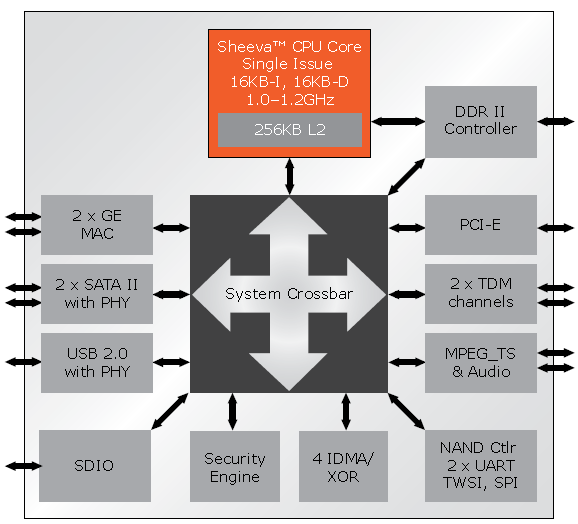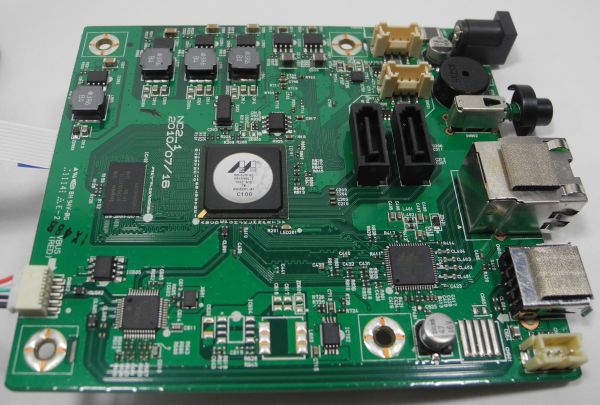Marvell has little competition in the entry and mid-level NAS platforms. The LG N2A2 NAS also uses a Marvell solution with the 88F6281 processor running at 1 GHz. On board is 1 Gbit (128 MB) of the Hynix HY5PS1G1631C DDR2 DRAM
The Marvell 88F6281 is a cut down version of the 88F6282 that we already saw in the Synology DS-211+ earlier this year. There is no LCD controller and one of the PCI-E interfaces is taken out. However, despite the presence of 2 GbE interfaces, only one is utilized by the LG NAS N2A2.

There are two USB 2.0 host interfaces which are used by the LG N2A2 NAS. However, the PCI-E interface seems to have been left unused.
On the whole, the LG N2A2 falls short of the Synology DS-211+, the 2 bay NAS we reviewed earlier. However, given the lower cost (the LG N2A2 is approximately half the cost of the DS-211+) and the targeting of the home consumers, we believe it is a decent tradeoff.











24 Comments
View All Comments
Chupathingy220 - Monday, July 18, 2011 - link
I've been swinging back and forth between picking up a NAS like this one, or repurposing an old netbook I have lying about with some Linux server software and simply attaching drives to it via USB. Suggestions?kmmatney - Monday, July 18, 2011 - link
I would just suggest picking up a copy of WHS (only $59 at NewEgg) and eityher using your old laptop or making a cheap server. I tried various solutions, such as a home-made NAS and Linux (Amahi). In the end, it's just so much nicer using Windows Home server. My only regret was wasting so much time with other solutions before getting WHS.Zan Lynx - Monday, July 18, 2011 - link
You can get better performance with WHS (or Linux) and your own hardware. Gigabit jumbo frames, four or five fast hard drives, you should be able to get over 80 MB/s in sequential access.But you lose one of the bigger advantages these little NAS boxes have, which is low power consumption and quietness.
name99 - Monday, July 18, 2011 - link
Why limit yourself to WHS or Linux?You can use a Mac Mini (low power when it's on AND it can go to sleep, registering itself with an AirPort base station, to be woken as necessary.)
OSX offers built-in striping, so hook up 3 USB drives and you can hit basically 100MB/s or so reads and writes.
SilthDraeth - Monday, July 18, 2011 - link
Maybe if WHS was installed on the Mac Mini.EddieBoy - Monday, July 18, 2011 - link
I'll second the comment about trying Windows Home Server. I have been using Version 1 for several years and it works great. Version 2 is getting good reviews although a few people were upset that it doesn't continue the use of Drive Extender. That didn't bother me too much as there are add-ons for DE if you really feel you need that functionality. The Newegg price for WHS is very tempting. I may have to grab a copy of Version 2 and upgrade my configuration.phu5ion - Monday, July 18, 2011 - link
If you are going to re-purpose an existing system, use a Linux server OS. You don't want some pesky GUI eating CPU time like some other OS options.kmmatney - Monday, July 18, 2011 - link
The GUI is Windows XP based - very light. You use a console app to connect to it most of the time, anyways. The GUI comes in handy when you need it. A lot of us just don't know Linux all that well to attempt running it without a GUI. I also use WHS to share (sort of) a scanner.ShoePuke - Monday, July 18, 2011 - link
I too agree that for most of the people that read Anandtech, a DIY NAS will get you way more features for same or less money. I was pretty psyched about WHS until they removed data redundancy in the new version (I thought that was it's best feature!). Now I'm using unRAID and love it. My 14 TB unRAID box draws ~35w idle and ~80w peak. Really like being able to mix drive sizes w/o penalty while having parity.Rick83 - Monday, July 18, 2011 - link
just got a 20 euro more expensive buffalo 2-disk NAS, which allows proper hot swap, but it is insanely loud (for what it is).I'd expect these enclosures to be silent and the disks to be minimally intrusive, but this one will have to be hidden in an insulated cupboard..